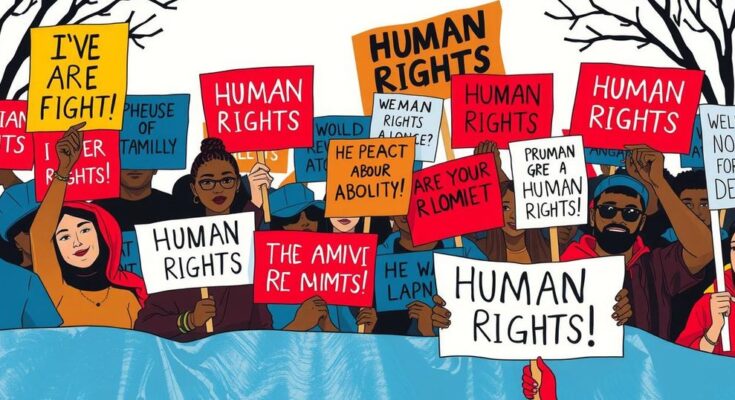Peru’s Congress has passed an anti-NGO law that restricts civil society organizations from seeking legal recourse for human rights violations. The law expands government oversight of NGOs, garnering criticism for threatening their independence. Activists warn this could significantly reduce access to justice for vulnerable populations as concerns rise over diminishing civil rights under the current administration.
Human rights organizations in Peru are expressing deep concern over the passage of a contentious anti-NGO law. This legislation restricts civil society organizations from pursuing legal action against the government for human rights violations, potentially depriving vulnerable populations of justice. The Peruvian Congress approved the amendment with a vote of 81 in favor and 16 against, amidst a growing backlash against civil liberties in the country.
The law expands the authority of the Peruvian Agency for International Cooperation (APCI), which increases government oversight over international aid and poses a threat to the autonomy of non-profit organizations. This legislation is part of a broader trend of regressive actions against civil and human rights, as well as press freedom, amid dismal approval ratings for President Dina Boluarte and her administration.
Proponents of the law argue that it enhances transparency over NGO funding and mitigates foreign interference. However, Alejandro Aguinaga, a congressman from the Fuerza Popular party, accused NGOs of exploiting international aid for personal gain, despite facing his own allegations concerning unethical practices targeting Indigenous populations.
Carlos Rivera, director of a prominent Peruvian NGO, denounced the law as “simply brutal,” asserting that it could significantly endanger legal recourse for victims of human rights abuses, who predominantly rely on NGOs for representation. He highlighted the severe penalties, including fines reaching $500,000, for NGOs that engage in litigation against the government.
Rivera compared this law to the 1995 amnesty laws, which once shielded military and police from accountability for abuses during Peru’s internal conflict. Julia Urrunaga from the Environmental Investigation Agency countered the narrative that NGOs operate without accountability, stating that they have adhered to APCI regulations for over two decades.
Furthermore, the regional organization representing Amazon Indigenous peoples, Orpio, criticized the law as a grievous setback for Indigenous rights and access to justice. Historically, civil society organizations have been vital to Peru’s development, especially during periods of military rule and political upheaval.
Pejorative perceptions of foreign aid have escalated, fueled further by the past administration’s serious cuts to USAid funding. President Boluarte has publicly claimed that the discourse surrounding human rights is often manipulated to undermine state authority. Amid ongoing investigations into her governance following widespread protests, her administration remains under scrutiny for alleged bribery and human rights violations.
The recent enactment of the anti-NGO law in Peru signals a troubling trend in the curtailment of civil society rights and human freedoms. Activists fear that the repercussions will gravely hinder access to legal justice for vulnerable populations. As President Dina Boluarte’s approval ratings plummet, the opposition to such regressive measures indicates a critical need for safeguarding civil liberties in Peru’s tumultuous political landscape.
Original Source: www.theguardian.com




